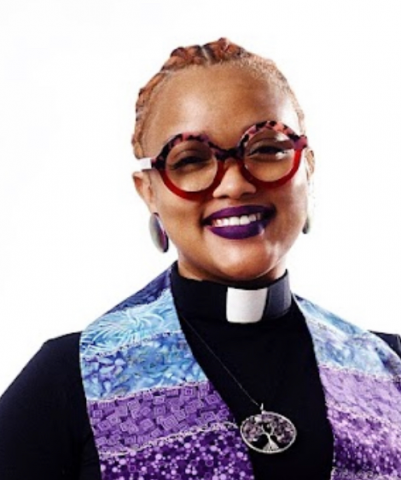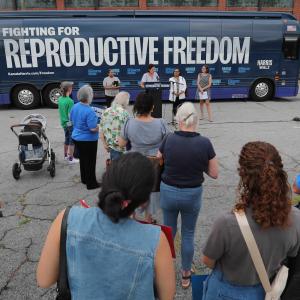
Tabatha is a writer in the Fall 2024 Sojourners Journalism Cohort. Learn more about the program.
Reverend Tabatha Holley, M.Div. (she/they) is a native of Dawson, Ga. She is a 2016 graduate of Spelman College where they received a B.A. Comparative Women’s Studies and a 2020 graduate of Union Theological Seminary where she received a M.Div. with a concentration in preaching, worship, and the arts.
At Union, Tabatha was awarded the 2020 Karen Ziegler Feminist Preaching Prize. They are the former pastor of New Day Church in the Bronx and the 2022-2023 Fellowship of Reconciliation’s Walter and June Keener Wink Fellow. She recently founded A Space to Land, LLC., to provide holistic, interfaith services to individuals and communities ranging from funerals and weddings to workshops, curriculum development, and conflict mediation. When it’s warm outside, you can find them at a local food and wine festival in her camping chair singing and dancing along to old school R&B.
Posts By This Author
Death Doulas Have a Term for What’s Happening to Our Church and Our Country
I’ve been caring for the dying since I was 22 years old. Before the rise in death doula work, I was a caregiver for my mother, who died of primary peritoneal carcinoma at 58 –years old. I sat with her during her chemotherapy appointments. I took notes at appointments with doctors. I created a rapport with her medical team so that I could be in the best position to advocate for her up until the very end.
My Church Expanded Its View of Reproductive Justice. Politicians Should Too
For several years, I pastored a small church in the Northwest Bronx. In the summer of 2022, the church leadership decided to dedicate one Sunday a month to do a service project where we engaged in direct political action. It was the summer when Roe v. Wade was overturned, and we focused our attention on reproductive justice. Instead of simply looking at reproductive justice as a pregnant person’s right to receive an abortion, we started thinking of it in broader terms: a better family welfare system in the U.S., honoring the bodily autonomy of birthing people, and taking steps toward improving the material conditions of Black and brown children in the Bronx through mutual aid, collective care, political education, and political solidarity.

